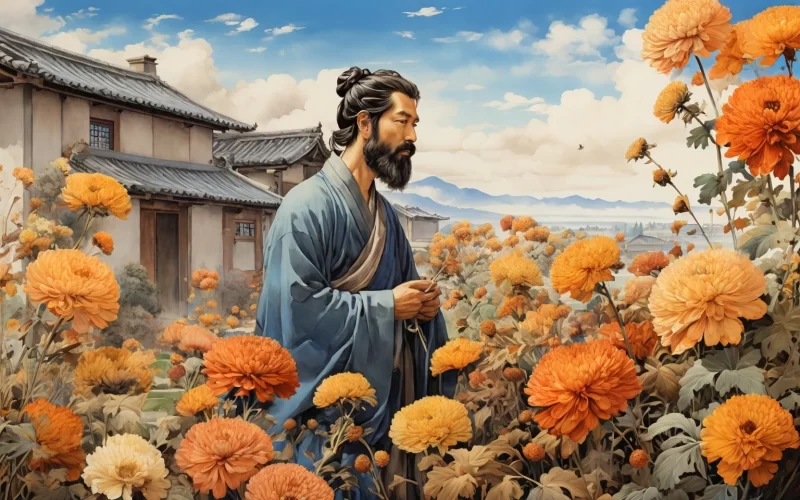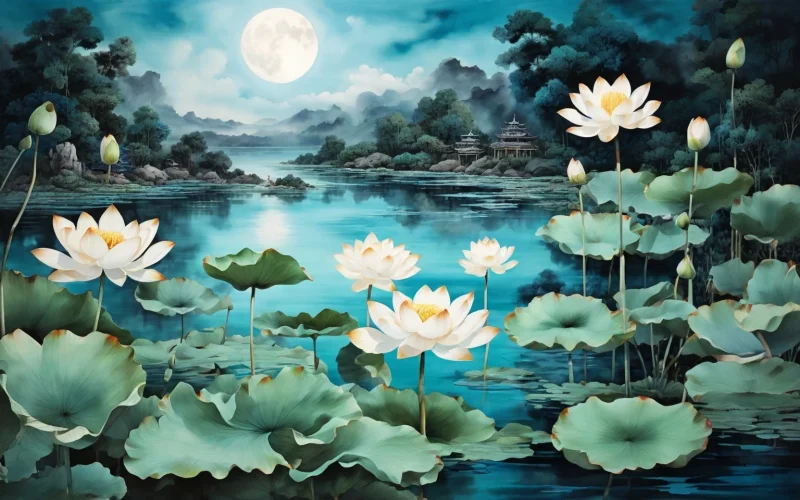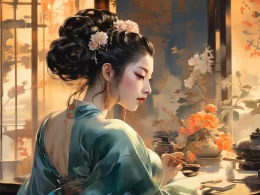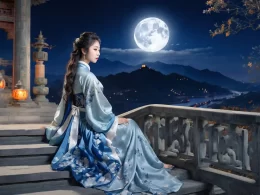In soughing western wind you blossom far and nigh;
Your fragrance is too cold to invite butterfly.
Some day if I as Lord of Spring come into power,
I'd order you to bloom together with peach flower.
Original Poem
「题菊花」
黄巢
讽讽西风满院栽,蕊寒香冷蝶难来。
他年我若为青帝,报与桃花一处开。
Interpretation
Composed around 875 AD during Huang Chao's repeated failures in imperial examinations, this poem channels his simmering discontent with societal injustice. As a future leader of peasant uprisings, Huang often expressed rebellious ideals through poetry. While ostensibly praising chrysanthemums, the work symbolically equates the flowers with oppressed masses and his own unyielding ambition to transform destiny.
First Couplet: "飒飒西风满院栽,蕊寒香冷蝶难来。"
Sà sà xī fēng mǎn yuàn zāi, ruǐ hán xiāng lěng dié nán lái.
Through whistling autumn winds they densely bloom,
Their chilled fragrance finds no butterflies in gloom.
The opening depicts chrysanthemums thriving en masse against harsh winds—breaking from traditional solitary elegance to symbolize collective resilience. "No butterflies" underscores their untimely blossoming, not as scholar-official lament but as protest against systemic neglect of common people's plight.
Second Couplet: "他年我若为青帝,报与桃花一处开。"
Tā nián wǒ ruò wéi qīng dì, bào yǔ táo huā yī chù kāi.
Should I become Spring's God in years to be,
They'll bloom with peach flowers, warm and free!
This volcanic declaration envisions the poet as Qingdi (Spring God) rewriting nature's laws. The revolutionary subtext is clear: future leadership would guarantee equal prosperity for all (chrysanthemums) alongside privileged classes (peach blossoms). No longer pleading to heaven, Huang assumes a creator's stance—"I shall become"—manifesting absolute agency.
Holistic Appreciation
The poem transforms floral admiration into socio-political manifesto. The first couplet's wintry chrysanthemums mirror oppressed realities; the second erupts with transformative will. Huang reimagines chrysanthemums from literati tropes to symbols of grassroots vitality, particularly through "densely bloom" and "I shall become"—marking both poetic innovation and emerging class consciousness. The shift from observation to intervention crystallizes peasant rebellion's ethos.
Artistic Merits
Employing symbolic parallelism, the work contrasts chrysanthemums' hardship with peach blossoms' privilege, sharpening its egalitarian message. Deceptively simple language builds relentless momentum—from environmental depiction to emotional crescendo to revolutionary vision. The fantasy of becoming Qingdi blends lyrical imagination with open dissent, placing Huang artistically and ideologically ahead of his time.
Insights
This is no conventional nature poem but a battle cry against predestination. Huang's determination to "replant seasons" embodies oppressed people's refusal to accept perpetual disadvantage. The poem reminds us that true equity demands not appeals but reconstruction of systems—a lesson echoing through centuries. Its power lies in wedding unvarnished rebellion to sublime artistry, proving dissent can be both visceral and beautiful. The chrysanthemums' eventual spring, like peasant emancipation, requires not nature's mercy but human agency's triumph.
Poem translator
Xu Yuanchong (许渊冲)
About the poet:
Huang Chao (黄巢), 820 - 884 A.D., a native of Heze, Shandong Province, was a leader of peasant revolts at the end of the Tang Dynasty. Huang Chao came from a family of salt merchants, good at horseback riding and shooting, with a rough knowledge of writing and ink, and little poetic talent. Huang Chao could read poems at the age of five, but as an adult, he failed to pass the exams. In 884 AD, Huang Chao was defeated and died in Wolf Tiger Valley.











